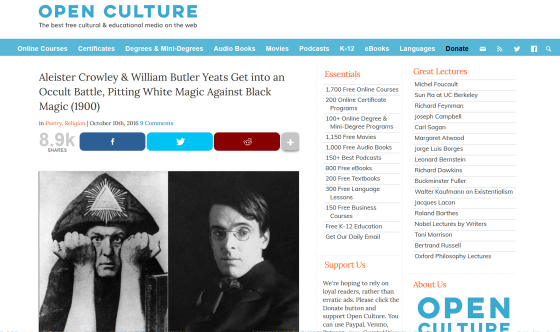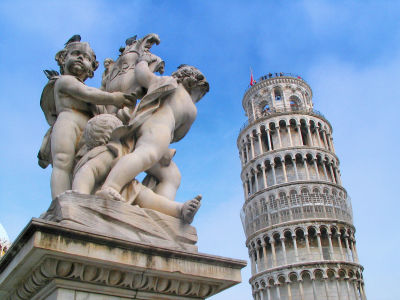What is the `` Battle of Bryce Road '' where the magician Aleister Crowley and the later Nobel Prize poet William Butler Yeats collided in London in 1900?

In April 1900, British magician
Aleister Crowley & William Butler Yeats Get into an Occult Battle, Pitting White Magic Against Black Magic (1900) | Open Culture
https://www.openculture.com/2016/10/aleister-crowley-william-butler-yeats-get-into-an-occult-battle.html

Crowley was born into a wealthy British family in 1875, and after entering Cambridge University in 1895, he was enthusiastic about mountaineering and poetry. On the other hand, he was devoted to occultism, and practiced magic and rituals by advocating the thelematic thought based on the rule and law of ``do what thou willest,'' and writings related to magic, including `` The Book of Laws .'' announced many. Despite being deported in various countries, he continued his missionary work and left a great impact on various cultures later.

by Wikimedia Commons
Yeats, on the other hand, was born in Ireland in 1865, and his first collection of poems, The Wanderings of Oisin and Other Poems, published in 1887, attracted attention in the London literary world, and he began his career as a poet. It's a person. Yeats had a strong interest in Irish legends and occultism, and had a strong influence on Irish culture by establishing the ``Irish Literary Society'' and the ``Irish Literary Theater.'' He also wrote plays influenced by Japanese Noh. I also make '

by Wikimedia Commons
Although they had completely different lives, Yeats, like Crowley, had a strong interest in occultism. I have. Founded in 1887, the Order of the Golden Dawn is a magical society descended from
The Golden Dawn included notable scholars and novelists of the time, including the actress and revolutionary Maude Gonn , whom Yeats was in love with, and Yeats himself. Crowley joined the Golden Dawn in 1898 and acquired various magical knowledge, but among them he was unpopular with the members.
It seems that Yeats, who was a more senior member of the group and a high-ranking adept within the group, also expressed concerns about Crowley. Both Crowley and Yeats were passionate about magical and mystical pursuits, but Crowley's occultism was darker and more paranoid than Yeats', and he was jealous of Yeats' success as a poet. It is said.

In 1899, Crowley, a source of concern within the Order, was denied promotion to Adept. Literary critic Richard Ellman , who wrote a biography of Yeats, wrote, 'When Crowley showed a tendency to use his occult powers for evil rather than for good, members of the Order, including Yeats, turned him into an adept.' I decided not to, because I was afraid that Crowley would blaspheme the mystery and release powerful magic against humanity.'
However, Crowley resented the decision and turned to MacGregor Mathers, the leader of the Golden Dawn, who had moved to Paris. Mathers promoted Crowley to Adept in the Paris chapter organization in January 1900, but this sparked a division within the group, and in March Mathers was expelled at a meeting in London. was determined by
In April of the same year, Mathers sent Crowley to the Isis-Urania Temple in London to retrieve important documents and ceremonial items from the archives. Yeats and others attacked this, an incident called 'Battle of Bryce Road'.
Ellman describes the Battle of Bryce Road as 'Crowley, dressed in Highlander tartan and bearing a black cross on his chest, arrived at the Temple of the Order of the Golden Dawn in London, bearing the sign of the Pentagram upside down. Crowley climbed the stairs, screaming at the adepts, but Yeats and two other white mages stood firm in their way to protect the sacred place. As Crowley came within range, the forces of good kicked him down the stairs.' Also, Yeats tried to stop Crowley with an exorcism ritual, and a certain spell caused Crowley to be sucked by vampires all night.
This Ellman's explanation is quite strange and humorous, but according to one theory, Yeats and others called the police when Crowley broke into the building, and finally Yeats and others won the court.

Although the opposition to Crowley in the Golden Dawn was in his personality, it is said that Crowley had an antagonism toward Yeats, who was a successful poet. Crowley's biographer Lawrence Soutine said, 'Crowley's earnestness in his youth could not make up for the technical problems and excessive rhetoric of his poetry.' On the other hand, Yeats also has anxiety about Crowley's magic, and Open Culture points out that there is a part of Crowley in the later poem ' The Second Coming '.
Open Culture describes the conflict between the two, saying that while Crowley's magic was antichristian and personal, Yeats sought to practice magic as part of a socially, politically, and aesthetically integrated activity. I said I was trying.
Related Posts:
in Note, Posted by log1h_ik







